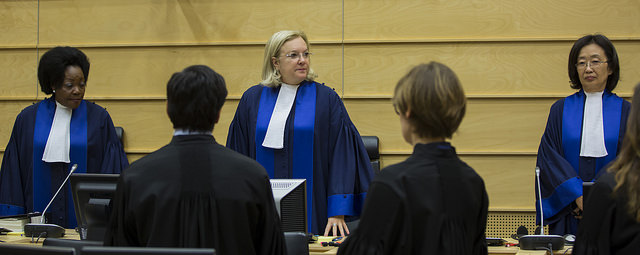
By Thomas Verfuss
Ambassadors and other diplomats, civil society/NGO representatives and journalists converged in the brand new Netherlands Foreign Ministry building next to The Hague Central Station on Monday for an electoral campaign debate: six new ICC judges will be elected in December. Victims issues featured prominently during the discussion.
The usually 18 judges of the International Criminal Court are elected for a term of nine years (which can be prolonged when they are part of a continuing trial). In order to ensure continuity, they do not leave all at the same time, but one third is replaced every three years. In December, the Assembly of States Parties (ASP) will convene in New York to elect the successors of the six judges whose term of office expires in March 2018. Kenya’s Justice Joyce Aluoch is one of those retiring. In fact, of the six outgoing judges, five are women and two are from Africa.
The debate in The Hague, organised by the Coalition for the International Criminal Court (CICC), gave the embassies of the 124 states parties to the Rome Statute the opportunity to get a personal impression of the 12 candidates and to prepare voting recommendations to their capitals. The job applicants had already submitted written information, which is available on the ASP website at https://asp.icc-cpi.int/en_menus/asp/elections/judges/2017/Pages/Nominations.aspx.
Victims issues came up during the debate. The candidate from Benin, Judge Reine Alapini-Gansou, stressed that ICC trials must get closer to the victims. Now, trials take place in The Hague, thousands of kilometres away in another continent. She hailed the “mobile tribunals” in the Democratic Republic of Congo that move around the country to try war crimes suspects on the spot, or at least near where the alleged crimes were committed. The ICC must consider “hearings outside the seat of the Court”, Alapini-Gansou said.
Journalists For Justice asked a question about the lack of checks and balances when the Office of the Prosecutor does not investigate and prosecute, although victims think there are clear indications of crimes having been committed and have their own ideas about who the suspects are. In national systems there are remedies available in that kind of situation: in the host state of the ICC, The Netherlands, a victim or another interested party can ask an appeals court to issue an order to the prosecutor to investigate and prosecute, which happened in high-profile cases like that of populist leader Geert Wilders. In Germany, the prosecutor commits a crime when [s]he refrains from prosecuting, though there are indications that the suspect has committed serious crimes – a disposition which was an impediment to extradition to international courts parliament adopted special laws.
At the ICC, there is nothing victims can do when they are angry about the prosecutor not prosecuting – apart from the “court of public opinion”. The candidate from Lesotho, Nthomeng Justina Majara, said it could be explored if “private prosecutions” should be introduced into the Rome Statute system. In her own country, where she is chief justice, victims dissatisfied about the absence of state prosecution can ask the authorities for a “certificate of non-prosecution”. They can then appoint their own investigators and prosecutors to proceed. She reckons, however, that contrary to the situation in Lesotho, such a system would be “more difficult to implement on the international level”.







